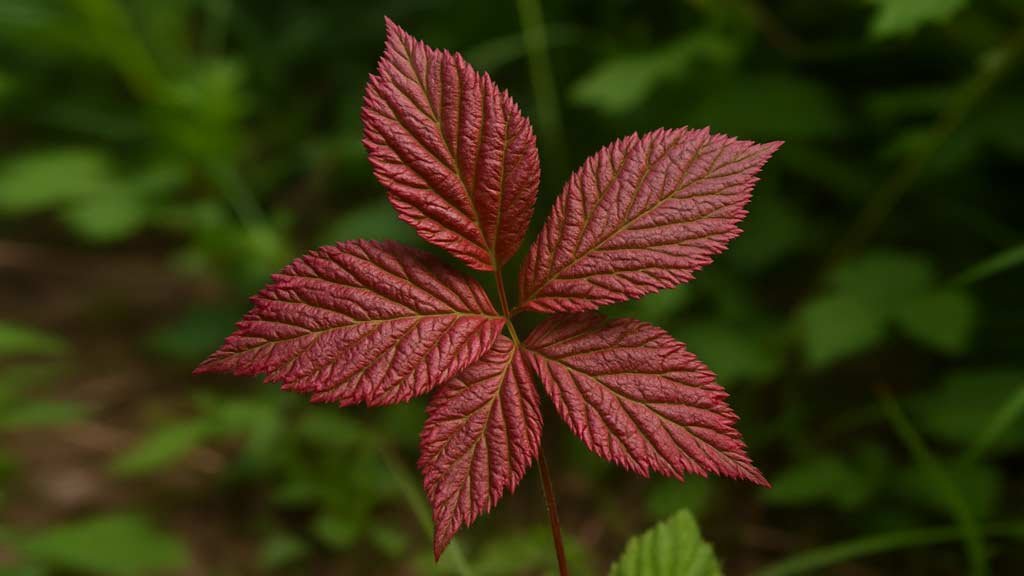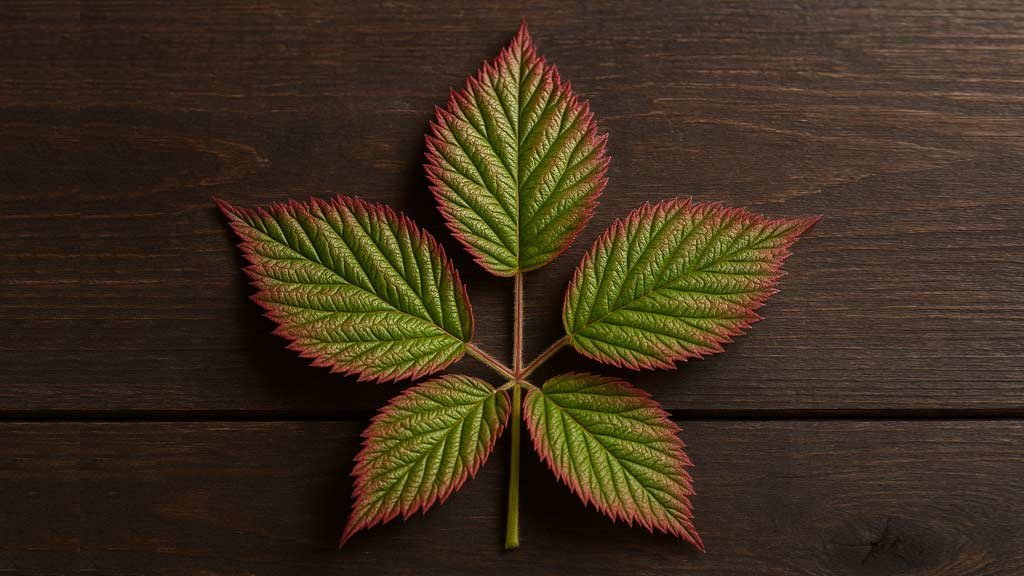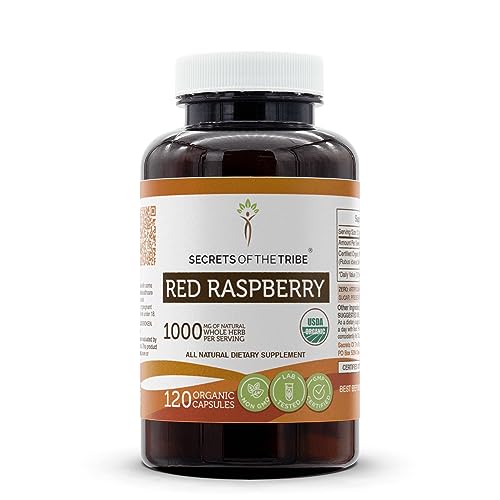The Ancient Reputation of Red Raspberry Leaf
Red raspberry leaf is one of those herbs that carries centuries of reputation in its veins. Women have turned to it in nearly every generation, across continents and cultures, for help with the rhythms of the body. The leaf of Rubus idaeus, the common raspberry plant, isn’t flashy. It doesn’t scream for attention with exotic origins or mystical folklore. It simply grows, quietly, in hedgerows and gardens, offering its deep green leaves to anyone who knows their worth.
For generations, midwives and herbalists have brewed those leaves into a tea meant to nourish, strengthen, and calm. Some women remember their grandmothers swearing by it during pregnancy. Others discover it today while scrolling late at night, searching for something natural to ease cramps or prepare their body for childbirth.
Table of Contents
Nutritional Backbone of the Leaf
If you strip away the romance and the old wives’ tales, what’s left is still impressive. Red raspberry leaf is packed with nutrients that make sense for women’s health. It’s rich in:
- Vitamins: C, E, and several B vitamins
- Minerals: magnesium, potassium, iron, and calcium
- Tannins: which give the tea its slightly astringent bite
- Fragrine: a compound often cited for its ability to tone uterine muscles
The nutritional profile reads like a multivitamin tucked inside a leaf. That matters. Because when you’re pregnant, losing blood, or simply cycling through the ups and downs of hormones, your body craves minerals like iron and magnesium in particular. They help with energy, blood building, and muscle relaxation.
Red Raspberry Leaf and Menstrual Health
Many women first meet raspberry leaf tea not in pregnancy but in their teens, when cramps become a monthly visitor. There’s an earthy logic to it: if a plant can tone and relax the uterus, then maybe it can soften those sharp edges of pain. And countless women say it does.
The tannins give the tea a grounding, slightly bitter taste, but they lend a stabilizing effect on tissues. It doesn’t knock cramps out like ibuprofen, but for some, it takes the edge off enough to function. Regular drinking, a cup or two a day in the week leading up to menstruation, is often reported to make cycles feel smoother, with less clotting and spasms.
Of course, not everyone notices a difference. That’s the tricky part with herbs. They don’t always give instant, dramatic results. They tend to work more quietly, over time, reminding the body of balance rather than forcing it.
Pregnancy and Red Raspberry Leaf
Here’s where the leaf becomes a hot topic. Many midwives suggest raspberry leaf tea in the second or third trimester of pregnancy. Why? Because of that compound fragrine, which is believed to tone the pelvic and uterine muscles. A toned uterus isn’t about tightening; it’s about strength and coordination. Think of it like training a muscle for endurance, not for bulk.
Women who drink the tea regularly often report:
- Shorter, less intense labors
- More effective contractions
- A smoother recovery postpartum
There are some small studies that echo these claims, showing that red raspberry leaf can reduce interventions like forceps use or prolonged labor. But research isn’t massive or definitive. The scientific world often raises an eyebrow, asking for more robust evidence. Still, the combination of tradition, anecdotal testimony, and preliminary findings gives the tea a steady foothold in pregnancy care.
I’ve heard stories of women sipping it like a ritual, a warm mug in the evening as they rubbed their bellies and visualized birth. It becomes more than a supplement—it becomes part of preparing the body and mind.
A Word of Caution
It’s not for everyone at every stage. Most practitioners recommend waiting until the second trimester before introducing raspberry leaf tea. In very early pregnancy, stimulating uterine tone is usually avoided. Women with a history of preterm labor or complicated pregnancies should definitely consult their care provider before using it.
Postpartum Recovery
Childbirth isn’t the finish line—it’s another beginning. And the body, after labor, needs rebuilding. Raspberry leaf tea continues to shine here. Because of its mineral density, it can help replenish what’s been lost through blood and effort. The astringent tannins also support tissue healing, making it useful in toning the uterus back down after birth.
Nursing mothers sometimes find it supports lactation indirectly, not by stimulating milk like fenugreek, but by strengthening overall vitality and nutrient supply.
A warm cup in the postpartum days can also be a quiet act of self-care, which might be just as important as any physical benefit.

Everyday Use Beyond Reproduction
Although raspberry leaf is most famous for pregnancy, it’s not limited to that chapter of life. The nutrients and toning effects can be useful across a lifetime.
- Bone health: thanks to calcium and magnesium
- Circulatory support: potassium helps regulate blood pressure
- Digestive steadiness: tannins can calm mild diarrhea
- General wellness: acts as a mineral-rich daily tonic
It’s a tea you can drink casually, not only in big life stages. Some people keep a jar of dried leaves in the kitchen, brewing it alongside nettle or peppermint for an everyday herbal blend.
Taste, Brewing, and Ritual
Let’s be honest: not everyone loves the taste. Red raspberry leaf tea has an earthy, slightly bitter edge, a bit like black tea but less smooth. Some describe it as “green” or “flat.” Adding a bit of honey, lemon, or blending with mint often makes it more palatable.
Brewing is straightforward:
- 1 tablespoon of dried leaves per cup of hot water
- Steep 10–15 minutes, covered
- Strain and enjoy
For stronger infusions, especially for pregnancy support, some women steep a handful of leaves in a quart jar overnight, sipping the mineral-rich brew the next day.
And something is grounding about the act itself: boiling water, waiting for steeping, holding a warm mug. It creates space in the day, a pause, which can be as healing as the herb itself.
Possible Side Effects and Considerations
No herb is universally safe. Raspberry leaf is generally well tolerated, but a few cautions exist:
- May cause nausea if taken in very large amounts
- Could theoretically stimulate uterine contractions too early
- The tannins can upset sensitive stomachs if over-brewed
Moderation is the keyword. One to two cups a day is the typical range. Always balance tradition with common sense.
Red Raspberry Leaf in Modern Herbalism
In a world where supplements come in shiny bottles and pills, raspberry leaf tea is refreshingly simple. It hasn’t been reduced to an extract or capsule for most users—it’s still a leaf, dried and steeped. That simplicity matters. It connects us with a plant, not just a product.
Modern herbalists often pair it with other supportive herbs. Nettles for extra minerals. Rose hips for vitamin C. Lemon balm for calming nerves. These blends create harmony, acknowledging that health isn’t one-dimensional.
Best Selling Red Raspberry Leaf Supplements
The Bigger Picture
Raspberry leaf isn’t a miracle herb. It won’t erase every cramp or guarantee a perfect labor. What it does is gentler, more subtle. It nourishes, tones, supports. It has earned trust over centuries because women felt the difference and passed on the knowledge.
When you drink it, you’re part of that lineage. A lineage of women brewing leaves, preparing their bodies, tending to cycles, and finding strength in the quiet gifts of plants.
Article Sources
At AncientHerbsWisdom, our content relies on reputable sources, including peer-reviewed studies, to substantiate the information presented in our articles. Our primary objective is to ensure our content is thoroughly fact-checked, maintaining a commitment to accuracy, reliability, and trustworthiness.
- Bowman, R., et al. (2021). Biophysical effects, safety and efficacy of raspberry leaf use in pregnancy: A systematic integrative review. Phytotherapy Research, 35(5), 2368-2385. https://pmc.ncbi.nlm.nih.gov/articles/PMC7871383/
- Bowman, R. L., et al. (2024). Raspberry leaf (Rubus idaeus) use in pregnancy: Associations with labour outcomes. BMC Complementary Medicine and Therapies, 24, 199. https://bmccomplementmedtherapies.biomedcentral.com/articles/10.1186/s12906-024-04465-7
- Medical News Today. (2021, September 27). Red raspberry leaf tea: Nutrition, benefits, and how to use. Medical News Today. https://www.medicalnewstoday.com/articles/red-raspberry-leaf-tea
- Healthline. (n.d.). Red Raspberry Leaf Tea: Potential Health Benefits and Risks. Healthline. https://www.healthline.com/nutrition/red-raspberry-leaf-tea
- European Medicines Agency. (2014). Assessment report on Rubus idaeus L., folium. European Medicines Agency. https://www.ema.europa.eu/en/documents/herbal-report/final-assessment-report-rubus-idaeus-l-folium_en.pdf
- Plant-Based Iron, Iodine, and Mineral Support Using Herbs - January 23, 2026
- Vegan Alternatives to Beeswax and Honey in Herbal Preparations - January 22, 2026
- Alcohol Free Herbal Extracts, Glycerites, Vinegar Extracts, and Teas Explained - January 22, 2026













